Part 1 - Results and
table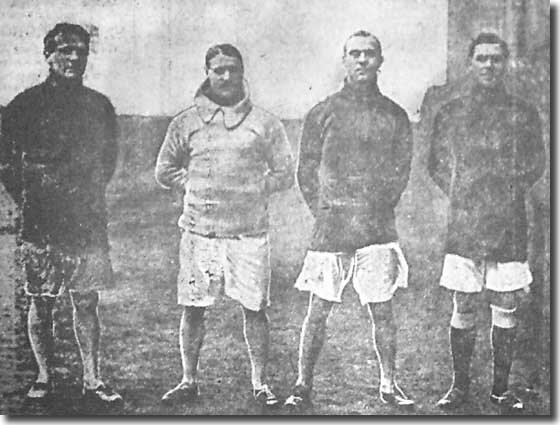
When the Leeds City directors sought a new secretary-manager in May 1912,
the man they singled out was up and coming Northampton Town manager Herbert
Chapman. They hoped desperately that the appointment would spark a
revival in City's fortunes. A run of four home defeats in December 1912
took the shine off what had been a reasonable start to Chapman's time
in charge, but he was laying out his plans to get the season back on track.
When he first arrived at Elland Road, Chapman had started sorting the
wheat from the chaff. During the summer he supervised the clear out of
a number of players whom he considered not up to scratch, including Alec
Creighton, Leslie Murphy, Jimmy Fortune and Tom Mulholland. The New Year
saw the exodus continue as Scunthorpe and Lindsey United signed both Hugh
Roberts and Tom Morris and then Stan Cubberley joined Swansea. The three
had been stalwarts of Frank Scott-Walford's team; indeed, Cubberley had
appeared in 181 League and 7 FA Cup matches for City and only Billy McLeod
and Fred Croot had made more appearances for the club, though George Affleck
would later inch past Cubberley's total.
Hugh Roberts was the star of the 1911/12 campaign
but had been lacklustre and pedestrian this time around, while Tom Morris
had not had a look in all season.
In the closing weeks of 1912 Chapman bolstered his attack by signing
Jimmy Speirs, Simpson Bainbridge and Arthur Price; in January he added
17-goal Shildon winger George Fenwick. He hoped the new men would inspire
a change of fortune.
1913 kicked off with a trip to Blackpool for a New Year's Day encounter,
with City bidding to end a run of six games without a win. The last victory
had come at the end of November, away to Nottingham Forest. Tom Broughton,
a right-half signed from Grangetown in October, made his first team debut
at Blackpool, partnering Evelyn Lintott and Mick Foley in the half-back
line. Irish international Billy Scott continued in goal, behind full-backs
George Law and George Affleck, who was playing just his second game of
the season. Bainbridge, Price, Billy McLeod, Speirs and Fred Croot formed
the forward line. City put an end to their losing streak with a sterling
3-0 victory.
The Leeds Mercury: 'Leeds exhibited much superior tactics ...
The attack was characterised by plenty of vim, the whole of the forwards
showing plenty of dash and a perfect understanding, which made them well
nigh irresistible. Robertson, McLeod and Speirs were frequently in the
picture, and the wing men showed a rare turn of speed, which was very
useful at times.'
After eleven minutes City took the lead through Croot. It was the only
goal of a first period dominated by the Citizens. Blackpool reshuffled
their attack and were much livelier after the break. Despite a number
of opportunities, however, they could not break down a resolute Leeds
defence. Croot, the most dangerous forward on the field, set City off
again, igniting a movement which ended with McLeod testing the keeper
from close range.
Shortly afterwards, City capitalised on a concerted assault on the Blackpool
area when Bainbridge grabbed a second goal after an untidy tangle in the
Seasiders' penalty area. With ten minutes remaining, McLeod made it three
from Croot's cross. It was the most emphatic of victories.
Suitably invigorated, the Peacocks sought another victory at Barnsley
but were defeated 2-0 in a game ruined by wind and rain. The South Yorkshire
team scored from a corner just before half time and wrapped up the points
in the closing minutes.
back to top
Nevertheless, JRB was remarkably upbeat with his report for the Mercury,
'There was not a real weak man on the field, although Broughton 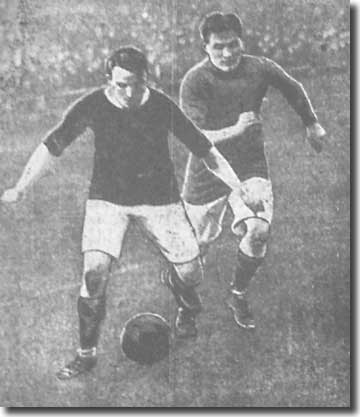 hardly
played with the dash that is required of a right-half. Speirs did many
smart things, and, together with McLeod and Croot, combined together in
some of the nice football we witnessed. Bainbridge as usual put in many
neat centres.'
hardly
played with the dash that is required of a right-half. Speirs did many
smart things, and, together with McLeod and Croot, combined together in
some of the nice football we witnessed. Bainbridge as usual put in many
neat centres.'
City hoped to take advantage of a home draw in the FA Cup first round
against Burnley on January 11, but the match was abandoned in the second
half after a blizzard, with the ground already under several inches of
snow. The Lancastrians were 4-2 ahead at the time, chiefly down to the
fact that they had enjoyed the considerable advantage of the conditions
in the first period. McLeod and Foley had got City's goals.
The Peacocks had hinted strongly that they might well get back on terms
after the change of ends, but just five minutes of the second half had
gone when the referee abandoned the game. With the pitch markings obscured
by snow, he had been unable to tell whether Bainbridge had been inside
the Burnley penalty area when he was upended.
The restaged match on Wednesday was 'one of the finest and most exciting
games ever seen at Elland Road' according to Yorkist, writing in the Mercury.
'Burnley beat Leeds City in the English Cup first round tie yesterday
by three goals to two, and while Burnley are to be congratulated on their
success, Leeds City are also to be congratulated ... and certainly did
not deserve to be beaten. They gave one of the best displays in the history
of the club.'
The conditions on the day were excellent with a clear, sunny outlook,
but the snow of the previous few days had left their mark, with the playing
surface in a poor state. The surface snow had been cleared away but the
ground underneath had been rendered a mudbath with the midfield 'practically
a swamp in which the ball continually stuck'.
Leeds restored Tony Hogg in goal for Irish international Billy Scott
and had the best of the opening exchanges, taking the lead in the sixth
minute. The goal was a spectacular one and came from a swift breakaway
after Burnley had won a free kick on the edge of the Leeds box. Edwin
Mosscrop took it and launched the ball towards goal, but Allan headed
away and then sent the ball out to Bainbridge on the right wing. The winger
spotted McLeod making ground at halfway and instantly fed on to him. He
beat two Burnley backs to the ball and ran on between them. As goalkeeper
Jerry Dawson came out to confront him, McLeod fired low into the net to
register a magnificent goal and send the home crowd wild with excitement.
With fifteen minutes gone, Burnley had an opportunity to equalise. From
a corner, outside-right Mosscrop was left with a gaping goal to aim at.
He sent the ball rolling towards the line only for Affleck to race back
and hoof clear. Burnley claimed it had crossed the goal line, but the
referee was adamant in rejecting their claims.
With City 1-0 up, Fred Croot panicked when presented with an easy opportunity
to add a second and blundered badly, firing straight into the keeper's
hands. Had he scored, the game might have been over as a contest.
Speirs was guilty of a similar lack of composure when he inexplicably
nudged Burnley centre-forward Bert Freeman off the ball in the City penalty
area after 33 minutes. The referee had little hesitation in awarding a
penalty and Burnley skipper Tom Boyle made no mistake from the spot, sending
the teams in at the break with the scores even.
Yorkist: 'The pace had been gruelling in the first half, and for twenty
minutes after the restart play was comparatively quiet. From that point
to the end, however, there was a succession of thrilling incidents. Hodgson
looked a certain scorer for Burnley when he got close in on Hogg. The
custodian stopped a hard drive, however, but he failed to hold the ball,
which rolled a few yards in front of him. Hogg and Hodgson raced for the
ball, and the custodian got to it first and cleared.
'Burnley gained the upper hand in the last twenty minutes. Lindley beat
Hogg from close range, but he was clearly offside, and the goal was disallowed.
Then, fifteen minutes from time, Burnley took the lead. Affleck had fouled
Lindley just outside the penalty area. Bamford took the kick and lifted
the ball into goal for Lindley to head through.'
With eight minutes remaining and Burnley 2-1 ahead, City right-back Law
attempted to clear the ball, only to see it skew off his foot and fall
to Freeman. The Burnley forward seized the opportunity, set off on a run
towards goal and fired home left-footed to give Burnley a two goal advantage.
'Many of the spectators began to leave the field, but the Leeds City
players never lost heart. They set up a strong attack, and were rewarded
with a second goal six minutes from time, Foley scoring with a fine shot
after Allan had hit the crossbar. Intense excitement reigned in the closing
minutes, as Leeds City made desperate efforts to draw level. They almost
succeeded, but luck was against them.
'Though beaten, Leeds City enhanced their reputation, and had fortune
been a little more kind, they would now be in the second round. They played
quite as good football as Burnley, and in fact were the better team up
to those last twenty minutes. The men on the side who distinguished themselves
most were Lintott and Foley. These two half-backs fairly excelled themselves
all through the piece, their tackling and placing being excellent. Allan
also did a lot of good work till he went lame in the second half.
back to top
'Of the forwards, Speirs, McLeod and Bainbridge were in fine form, but
Robertson and Croot were both below par. Affleck was a sound defender
all the way through. Law played well in the first half, but fell away
towards the finish. Hogg made several capital saves, and was in no way
to blame for any of the three goals scored against him.'
After such a titanic clash, it would have been understandable if the
following week had brought an anti climax, but not a bit of it. City beat
Bradford Park Avenue 2-0 and looked impressive in doing so. The game was
played out on a quagmire, worsened by a thick layer of sand. The contest
was goalless at the break, but City played much more effectively in the
second half and around midway Foley scored from a Bainbridge corner. Within
a minute Speirs broke clear on his own to add a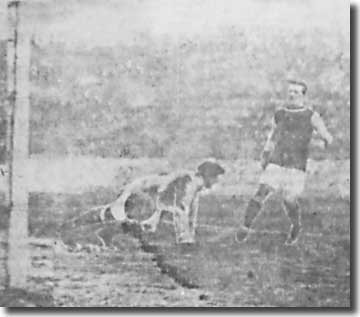 second with a long low drive from the right, his first goal for City.
He came close to scoring again in the closing stages. The match marked
the final appearance in a City shirt for Stan Cubberley, now off to Swansea.
second with a long low drive from the right, his first goal for City.
He came close to scoring again in the closing stages. The match marked
the final appearance in a City shirt for Stan Cubberley, now off to Swansea.
City were unlucky not to win again the following week at Wolves. JRB
in the Leeds Mercury: 'Nothing but sheer hard luck prevented Leeds
City from emerging triumphant from a good, if not brilliant, game ...
In the first place, there was a clear case of a penalty when McLeod was
brought down just before the interval - but the referee declined to allow
it - and in the second place, when Foley had the misfortune to put through
his own goal while endeavouring to stop the ball preparatory to clearing.
'On the day's play there was little to choose between the teams, but
the City thoroughly deserved their lead at the interval. Their display,
both in defence and attack, was better than that of the Wanderers, and
the goal scored by Bainbridge was a merited reward to one of the many
attacks made by the City.'
City had the weekend of 1 February off as it was the FA Cup second round,
and they plugged the gap with a friendly against Northampton, giving the
Elland Road fans the chance to see the much admired Fanny Walden. Their
attention was also on City's new signing, left winger George Fenwick.
Fenwick scored a couple of goals as Leeds won easily. He retained his
position a week later when the Citizens entertained Leicester Fosse and
hit peak form to thrash the Midlanders 5-1. The victory took them five
places up the table to 9th, but it was the manner of the performance as
much as the result that warmed Yorkshire hearts.
The Yorkshire Post: 'Changes in the City team have been numerous
throughout this season, and Mr Chapman, the manager, is slowly but surely
evolving a set of players from whom much may be expected in the future.
His latest acquisition is a youth named Fenwick, from Shildon, and although
his methods are rather crude at present, he evidently possesses talent
capable of being turned to good account under skilful training. Speirs'
display was the outstanding feature of the match, as in addition to scoring
a goal direct, his work paved the way for two other successful efforts.
McLeod's goal was the culmination of a fine piece of individualism, which
elicited generous acknowledgement from the crowd.'
It was twenty minutes before there was a goal, though Speirs had gone
close on two occasions. Price opened the scoring easily after being found
by Speirs, and from that point on, Leicester Fosse were simply incapable
of denying City. Five minutes later the Peacocks consolidated their position
when Speirs added a second.
There was no further score before the break, but it was 3-0 soon afterwards,
Fenwick scoring after Speirs' shot was blocked. Price quickly netted his
second, tenaciously working his way through the Fosse defence before firing
home.
McLeod added a fifth with the best effort of the day. He secured possession
at halfway and dribbled smartly up the middle despite the attentions of
opposing defenders. He sidefooted the ball home from close range after
deceiving the keeper. Fosse pulled one goal back from a penalty in the
closing seconds but it couldn't take the shine off a tremendous display.
Just as it seemed that City had got their act together, they inexplicably
lost by six clear goals at bottom-placed Stockport County.
The local papers claimed that the score did not represent the run of
play. In many ways they were right as City were a single goal behind at
the hour. But then there came an amazing collapse, with five further goals,
the final four in the space of eleven minutes. County centre-forward Smith
claimed four of the scores, but it was reported that City keeper Hogg
and backs Affleck and Copeland performed great feats in defence. Nevertheless,
the thrashing brought a demotion for Hogg. The Geordie had taken over
from Billy Scott in the FA Cup against Burnley in January, but now gave
way to Scott for the three games that followed.
It was astonishing after such a setback that City could respond by giving
their performance of the season, when table-topping Preston North End
were the visitors at Elland Road on 22 February.
The Lancastrians, the first ever League champions in 1888, when they
had also won the FA Cup, had lost just twice all season, their first in
the second flight, and were odds on favourites to recover their First
Division status. But they were left in disarray as the Peacocks overwhelmed
them, triumphing by five goals to one.
back to top
JRB in the Mercury: 'There was never a doubt as to the ultimate
destination of the points, Leeds City being complete masters of the proceedings
throughout. Right from the commencement of the game to the finish did
the home team display wonderful form. Seldom have the team, as a whole,
played better, and individually the players did some very clever things,
especially Scott, the custodian, who gave some of his international form;
while the headwork of Lintott was another feature of the game, as also
was the goal headed into the net by Bainbridge.'
City were immediately onto the attack - Foley's shot was deflected narrowly
wide of the post by McCall; Robertson was unlucky when he headed the resultant
corner over the bar, and then McLeod had a goal chalked off for offside.
It was not long before the pressure told, and Leeds deservedly took the
lead in the twelfth minute. Affleck scored from a penalty after Fenwick
had been fouled when in a scoring position. Preston rallied at that point,
but were kept at bay by good work on the part of Copeland and Affleck.
City were not long under the cosh, and scored twice to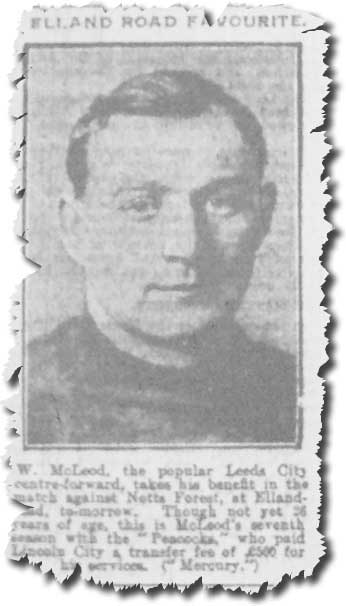 establish a 3-0 lead. Preston rallied again and pulled a goal before the
break.
establish a 3-0 lead. Preston rallied again and pulled a goal before the
break.
City scored twice more in the second half - 5-1. North End could have
managed a consoloation in the closing stages, but Scott saved a penalty
from Halliwell to complete a marvellous afternoon. Fenwick had grabbed
two goals and Bainbridge and Foley one each after Affleck's opener.
The result sent shock waves through the division, demonstrating in the
most emphatic of fashions that that City were a match for anyone on their
home turf.
They showed the result was no fluke the following week at second-placed
Burnley. The Turf Moor men took a two-goal lead but City refused to accept
defeat. McLeod and Speirs scored in the final 23 minutes to earn a merited
point.
Wanderer in the Mercury: 'The first goal was a beauty, for Law,
who was some considerable distance from goal, dropped the ball out to
Fenwick, the winger headed in to McLeod, and that player popped the leather
into the net with his head. McLeod had a big share in the scoring of the
second goal, for which it seemed almost certain that the ball would go
over the dead line. He nipped in, turned it into the centre, and Speirs
put on the finishing touch.'
City built on their revival by beating Hull 1-0, McLeod's winner coming
a minute before the interval after wing to wing interplay between Speirs
and Bainbridge. The game was overshadowed by the conditions with Hull
playing into a first half gale and hailstorm.
JRB in the Mercury: 'All the Leeds team played well to a man.
There was little to choose between the forwards, and the defence was always
reliable. Copeland and Affleck kicked with plenty of strength, and their
play was a feature of the game. Scott, who, by the way, has been placed
on the transfer list at his own request, had few difficult shots, but
he cleared in style.'
With Scott intent on a move, Tony Hogg was recalled between the posts
for the remaining two months of the campaign. With his return, City's
depressing inconsistency resurfaced; they lost 2-1 on 15 March at Glossop,
struggling along in the bottom four. The Citizens had enough chances to
win the game easily but the forwards wasted all but the one that Billy
McLeod scored around the half hour mark. McLeod snatched two more on Good
Friday at Grimsby, but Leeds lost again, by the odd goal in five.
A brace from Speirs and yet another from McLeod were enough to see off
Clapton Orient the next day, and it was McLeod once more on Easter Monday
at Bury, snatching an equaliser to force a 1-1 draw. A day later and McLeod
bagged a hat trick, with Speirs contributing another goal as City hammered
Bury 4-2 in the return at Elland Road.
JRB in the Mercury: 'The display given by the City forwards yesterday
was brilliant ... Their combination and passing was a feature of the game,
so also were the characteristic dribbles given by McLeod, who scored the
goal obtained by the City in the first half. He took the ball from Price,
who had received from a rebound and found the net with a capital shot
... Leeds were undoubtedly the better team in the second half, and although
they scored three times, twice through McLeod and once through Speirs,
they deserved to score also on two other occasions. Affleck hit the crossbar
with a penalty kick, as also did McLeod when close in, and from the rebound
Speirs hit the upright. Bainbridge also sent in shots which narrowly missed.'
McLeod's impressive goalscoring record had caught the eye of the England
selectors, who came to watch him and Evelyn Lintott during the game at
Bury. Morag Roberts, a member of the International Selection Committee,
had already watched McLeod during the victory against Hull City on 8 March.
In the eventuality, nothing came of the interest but it was gratifying
nonetheless.
McLeod was in a rich vein of form in front of goal and he scored in both
of the next two games, 3-3 at Lincoln and a single goal victory at home
to Nottingham Forest. That was the ninth consecutive match in which he
had scored and the goal helped City consolidate their seventh place. It
was an extraordinary run in front of goal and clearly he was in the form
of his life. Defenders were well advised to keep a tight grip on the centre-forward.
City had announced some time previously that the Forest fixture would
serve as a benefit match for McLeod. The occasion attracted another 20,000
crowd to Elland Road, and in addition to the gate receipts of £500, he
received around £100 from subscriptions and collections. It was a well
deserved reward for a player who had provided excellent service over the
seven years he had spent at the club.
back to top
It was only fitting that he should mark the occasion by scoring the only
goal of the game, slipping the ball home after keeper Hanna had parried
a shot from Robertson. McLeod's performance wasn't up to his normal standard,
the absence of Speirs cited as a major reason. His presence since Christmas
had been a major factor in the revival in the centre-forward's form.
McLeod didn't make it onto the scoresheet on 12 April, when a Speirs
goal secured a point at Bristol City, but he was only prevented from doing
so by an upright, which kept out a fiery shot.
The two men were both on target again, Speirs bagging a double, when
City hammered Birmingham 4-0 on 19 April to complete an impressive run
of eight straight victories at Elland Road.
The win left City sixth, still in with a shout of a top five finish,
but a 1-0 defeat on the last day at Huddersfield crushed those hopes.
City looked well worth a point and on occasions hinted at snatching both,
with Town keeper Mutch being forced to make several outstanding saves.
The Terriers won the game with a goal from Armour, scored just before
half time.
It was a disappointing conclusion to a campaign which ended with City
ten points short of promotion, though this was their best placing since
their debut season in 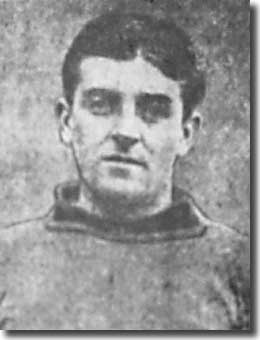 1906.
1906.
At times, the Peacocks had been well nigh irresistible on their native
soil. Certainly, the top four, Preston, Burnley, Birmingham and Barnsley,
would attest to that, each suffering emphatic defeat at Elland Road. All
the more galling, then, were the four successive home reverses in December
which put at an end any faint chances of promotion.
In sharp contrast, City's away form was poor, with only three victories,
none of them coming after New Year's Day.
The rearguard remained as erratic as ever, conceding 64 goals. Of the
high profile defenders signed at the start of the season, it was only
the impressive Evelyn Lintott who lived up to his billing, being ever
present and a most reliable performer. Billy Scott began well but as the
season progressed, lost both his form and his place. The two new full-backs,
George Law and Jock Ferguson, were replaced by Charlie Copeland and George
Affleck after Christmas, although Ferguson instead became a regular choice
at right-half.
Despite the blight of inconsistency, it had been an impressive campaign.
The verve with which the team played and the profile of the new men had
spectators flooding back to Elland Road in their thousands. The signing
of Jimmy Speirs was crucial, a catalyst for post-Christmas improvement.
His arrival brought the best out of Billy McLeod and the pair struck up
a wonderful understanding. McLeod's total of 27 League goals set a new
club record, easily beating the 17 he himself had recorded in 1908. In
the process he completed a League century for the club, moving his tally
on to 117. The 70 goals that the club hit in the League also established
a new high. The dashing displays of Simpson Bainbridge on the right flank
had greatly enhanced the service to the front men, while Price, Fenwick
and Copeland showed rich potential.
The average home attendance rose from less than 8,000 in 1911/12 to more
than 13,000; another financial loss was sustained, but a corner had been
turned and the club was soon to generate a small profit, a remarkable
turnaround. 'Chapman ... has done a tremendous amount of good work for
the club; he has gained the confidence of everybody,' wrote the Yorkshire
Post.
This was clearly more like it and the Board were convinced that they
had found the right man in Herbert Chapman. He had not achieved his stated
aim of promotion, but had taken the club several massive strides in the
right direction. The club's beleaguered supporters could finally look
forward to a rosy future.
Things would turn out even more positively in the campaign that followed.
Part 1 - Results and
table












 hardly
played with the dash that is required of a right-half. Speirs did many
smart things, and, together with McLeod and Croot, combined together in
some of the nice football we witnessed. Bainbridge as usual put in many
neat centres.'
hardly
played with the dash that is required of a right-half. Speirs did many
smart things, and, together with McLeod and Croot, combined together in
some of the nice football we witnessed. Bainbridge as usual put in many
neat centres.' second with a long low drive from the right, his first goal for City.
He came close to scoring again in the closing stages. The match marked
the final appearance in a City shirt for Stan Cubberley, now off to Swansea.
second with a long low drive from the right, his first goal for City.
He came close to scoring again in the closing stages. The match marked
the final appearance in a City shirt for Stan Cubberley, now off to Swansea. establish a 3-0 lead. Preston rallied again and pulled a goal before the
break.
establish a 3-0 lead. Preston rallied again and pulled a goal before the
break. 1906.
1906.